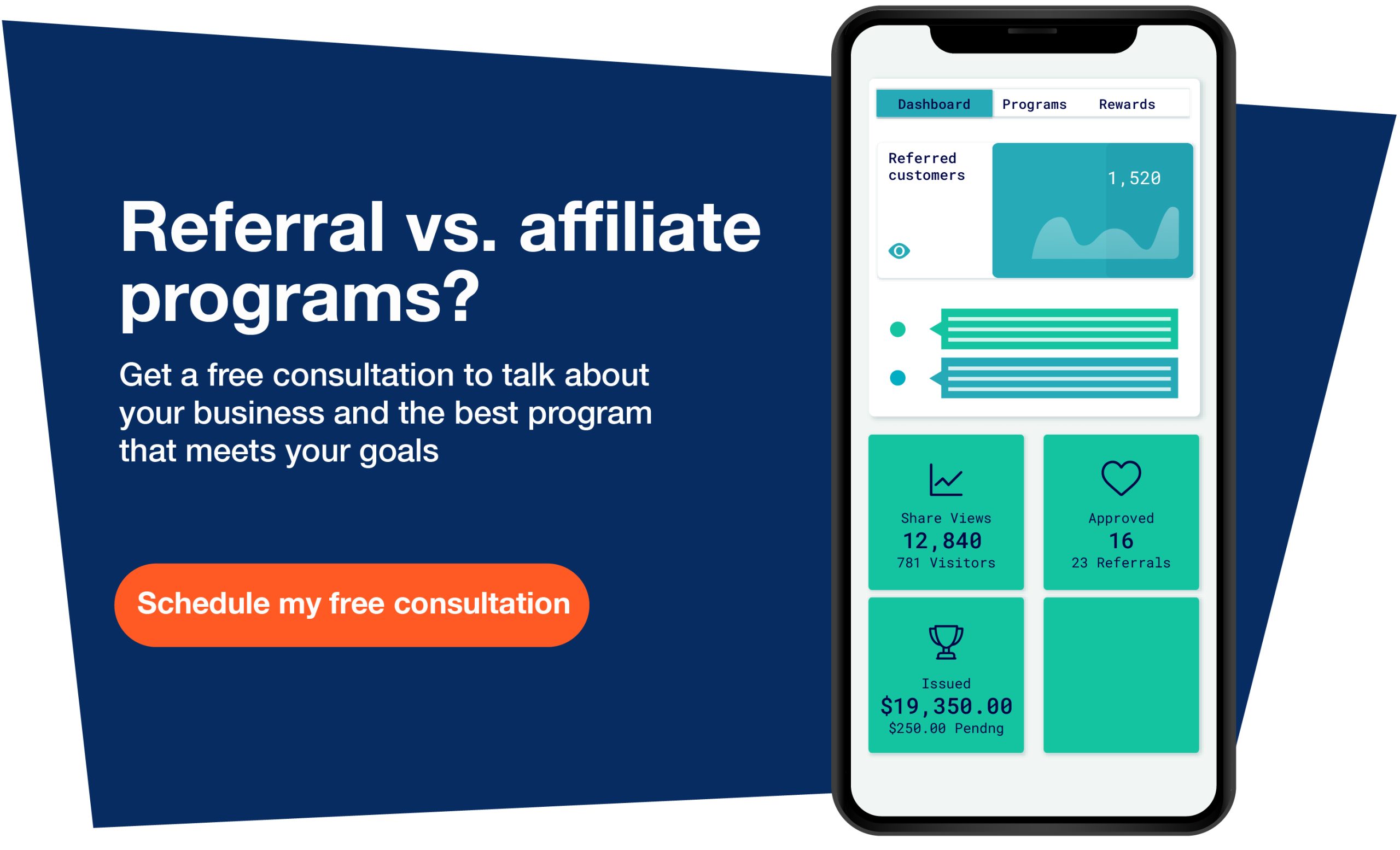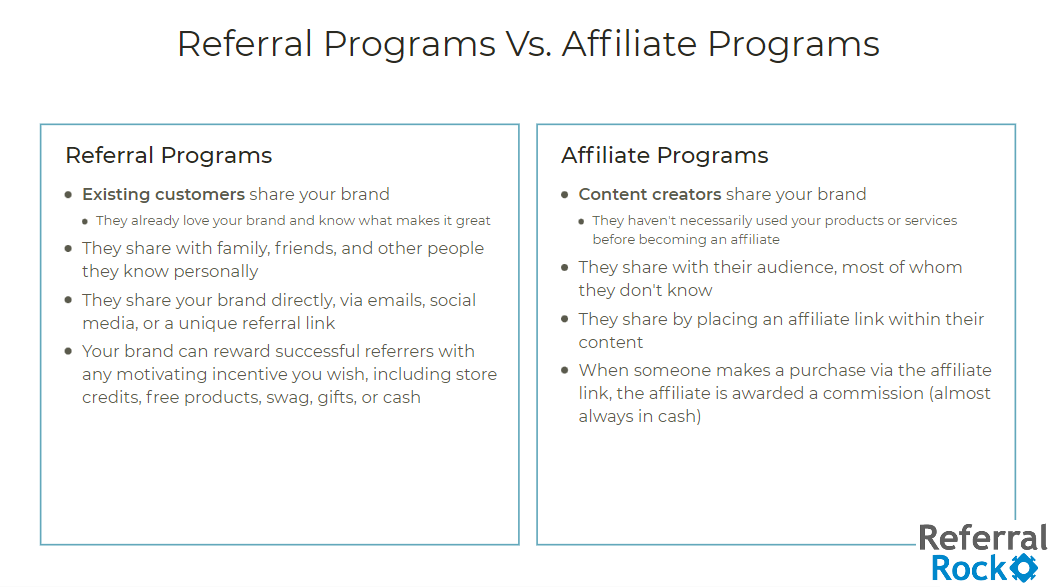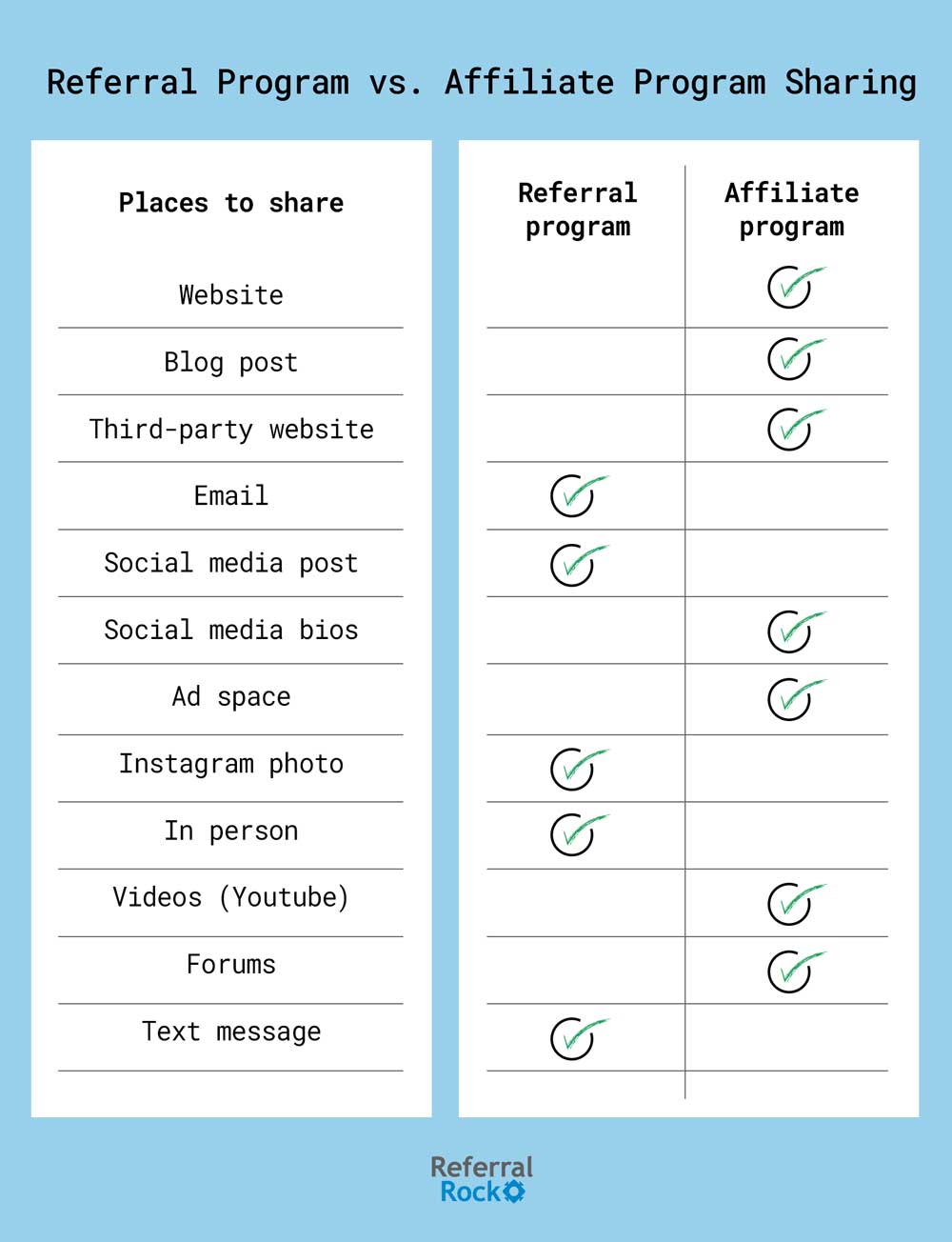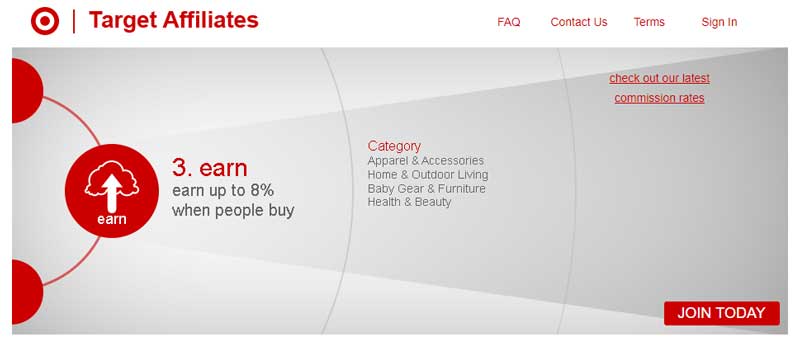Digital marketing efforts come in many forms, but there are two types of marketing that cause a bit of confusion: referral programs vs. affiliate programs.
What’s the difference between a referral and an affiliate? Which one is better for your business? We compare affiliate vs. referral programs to find out.
Referral programs vs. affiliate programs
What makes referral marketing different from affiliate marketing? Here are the main differences between affiliate programs vs. referral programs.
In a referral program, your existing customers share your brand with family and friends (people they know) to earn rewards.
Meanwhile, an affiliate partner does not have to be an existing customer of yours. Rather, an affiliate is a third-party content creator who shares your business on their channels and receives commissions on new sales. Affiliates must have an audience that matches your company’s target market. But many members of this audience are people the affiliate doesn’t know personally.
Now let’s take a deeper dive on what makes affiliate marketing different from referral marketing, and what similarities both marketing programs share.
What is a referral program?
A referral program offers existing customers an incentive each time they successfully refer someone they know to your company. The incentives vary from program to program – common incentives include one-time discounts, store credits, a gift card, or a service upgrade.
The key participant of a referral program is the customer (or advocate). The advocate shares a unique referral link with family and friends, which traces every referral back to the advocate who made it. When a referred friend makes their first purchase, the advocate earns the incentive as a thank you for bringing in the new business.
What is an affiliate program?
An affiliate program, on the other hand, compensates content creators (bloggers, influencers, brand ambassadors, and other partners) for any new customers they bring in. Affiliates place trackable affiliate links within their content. If one of their readers or followers clicks the affiliate link and makes a purchase, the responsible affiliate earns a reward.
Affiliate program rewards are called commissions, and are almost always cash-based. Affiliates could receive a flat fee commission payout for each sale, a percentage of the first sale, or a recurring percentage (if the product is a monthly subscription).
What’s the difference between referral and affiliate marketing?
To further understand the differences between affiliate programs vs. referral programs, and help you decide what work best for your brand, here are some defining factors.
1. The individual referring new customers
From the start, the individuals invited to join an affiliate program vs. referral program are vastly different. The following table explains the difference between the two:
| Referral programs | Affiliate programs |
| Referral programs typically target current satisfied customers, fans, or brand advocates.
A form of word-of mouth marketing, referral programs give each customer a unique referral link and reward them for every successful referral. Advocates in a referral program already know and love your products, and want to share the awesome experience they’ve had. |
An affiliate can be any content creator interested in generating income by promoting another business. Individuals apply to join the affiliate program or are contacted directly by the business.
Affiliates don’t have to be familiar with your products or services before they become affiliates. But if they haven’t used your products before, it’s a good idea to let them try your products for authentic promotion. |
2. The relationship with the potential customer
Another big difference between an affiliate program and a referral program is the type of relationship between the person who is referring (the affiliate or customer) and the person being referred to the business (the potential new customer).
| Referral programs | Affiliate programs |
| Referral marketing works best when there is an existing relationship between the customer and the referral.
Successful referrals are usually friends, family, or colleagues. The existing relationship and trust between parties is what leads to a successful referral. |
In affiliate marketing, there is no direct relationship between the two parties. The person who clicks on the affiliate link doesn’t need to personally know the affiliate, although there is usually some degree of trust.
For example, subscribers to a Youtube channel or podcast don’t know the host, but trust their recommendations. |
3. How the program is shared
The strategies for sharing these two types of reward programs are slightly different. Referral programs usually take a more direct approach, whereas affiliate programs rely on people landing on an affiliate page.
| Referral programs | Affiliate programs |
| Referral programs have a more specific, intentional approach. Most messages are sent to friends and family through direct channels, such as email, text, or social media messages.
This personal customer engagement usually results in a higher chance of the person making a purchase. |
Affiliate programs involve promotions on public channels, within related content the affiliate creates. It’s as simple as including a link on the affiliate marketer’s site, newsletter, or social media post.
This means that affiliate sharing has a wide reach: one affiliate link can reach a large audience all at once. |
What’s the difference between an affiliate link and a referral link?
Both affiliate links and referral links are used to track any new customer or sale that comes from a program participant. As soon as an affiliate or customer signs up to your program, they are given a unique link they can use to invite others to visit your website or product page. This link contains a unique code that traces sales made through the link back to the person who shared the link.
The key difference between affiliate links and referral links is where they’re shared. An affiliate link is published to the public, usually through a website, blog post, or social media posts. A referral link is typically sent as a direct message from person to person (although providing message templates can make the sharing much easier).
4. The types of rewards
Rewards are the ultimate driving factor in both referral programs and affiliate programs. Even if someone really loves your business, an attractive incentive will keep them motivated to refer others.
Rewards can vary greatly across different affiliate vs. referral programs. Programs can choose between giving one-time rewards, recurring rewards, or tiered rewards.
But there’s one key difference between rewards in affiliate vs. referral programs – affiliates generally expect cash as their reward. Meanwhile, there are lots of different types of referral rewards you could offer in a referral program, including cash, store credits, discounts, upgrades, and swag.
| Referral programs | Affiliate programs |
| Popular incentives for a referral program include discounts, store credit, coupons, cash back, or gift cards.
Rewards can also be given to only the existing customer (the one referring others), the new customer (the referral), or both (a dual-sided incentive). |
Affiliate programs typically offer cash-based incentives (affiliate commissions), in the form of a flat fee or percentage of each sale.
It’s also common for affiliates to get a free product on top of their cash compensation, especially if they perform well or have been affiliated with the company for a while. |
5. The customer lifetime value (CLV)
Customer lifetime value (CLV) indicates what you can potentially earn from a customer over the period of their relationship with your business. Will the customer only make a one-time purchase, or will they become a long-time customer with regular orders?
This greatly depends on the product or service you are selling. Some products, like cars or larger equipment, are generally intended for one-time purchase. (Of course, the company can also supplement this with other items and services.) Other products, such as consumables and subscription services, will naturally keep your customer base coming back.
| Referral programs | Affiliate programs |
| A referral program works well with a variety of products and services.
Since referral programs are based on loyal customers and trust, they work especially well for products with a higher CLV. |
Compared to a referral program, an affiliate program can work better for businesses with a lower CLV (as long as that business is established).
As affiliate programs pay for every new customer, affiliates are more focused on quantity and scale. |
What are similarities between an affiliate program vs. referral program?
While affiliate programs and referral programs have their differences, they do share a few similarities. The biggest similarity is they both encourage others to promote a brand and typically offer an incentive for every sale.
Below are a few other ways affiliate programs and referral programs are alike.
1. They rely on social currency
Both programs are based on inviting others to become new customers. Whether that invite comes from an existing customer or an affiliate, it naturally involves a level of risk.
What happens if the referred customer doesn’t like the product or service? Or has a bad experience with the business?
If things don’t go as planned, there’s a certain amount of trust or social currency that’s lost from the referring party.
| Referral programs | Affiliate programs |
| Since referrals come from existing customers, there’s an implied guarantee the product or service is good. After all, they’ve already tried it themselves.
So when a customer refers their family and friends, it’s assumed that the product is worth trying and will work for them, too. |
In affiliate marketing, the link is placed on a public platform, like a blog post, landing page, or an online video.
Even if there’s no direct communication, visitors decide to click on the link based on trust and the affiliate’s reputation. |
2. They’re both repeatable marketing strategies
Both affiliate programs and referral programs are intended to drive consistent growth. They rely on other parties to advocate their business, generate word of mouth, and help bring in new leads and sales.
| Referral programs | Affiliate programs |
| A referral program build a long-term meaningful relationship with your customer, inviting them to share with their friends and rewarding them for their efforts.
Though referral programs may not see much traffic as an affiliate program, they do generate higher quality leads and higher conversion rates. |
Many affiliate programs include their links in engaging content, such as high traffic blog or posts on their social network.
Even if there’s no direct communication with potential customers, these affiliate links are easily clicked by anyone with an existing interested in your product or service. |
3. They’re both cost-effective
Assuming you use referral software or affiliate software –and not an affiliate network – referral and affiliate programs are much more cost-effective than other marketing methods. Both programs also carry a much lower financial risk than paying for ads. After all, with referral and affiliate marketing, you only pay for performance (in other words, you only give rewards when a sale is made).
| Referral programs | Affiliate programs |
| With a referral program, you’ll pay once for referral software, and then you’ll only pay when a customer’s referral results in a purchase.
You also have full control over the value and types of rewards you offer. Although both programs are cost-effective, referral programs are more affordable to set up than affiliate programs. |
With an affiliate program (run with affiliate software), you’ll only pay once for the software, and then you’ll only pay when someone clicks an affiliate link and makes a purchase.
Although you’ll need to pay an affiliate in cash, you’ll have full control over the commission amount. |
Pros and cons of referral vs. affiliate programs
Still need to know more about referral vs. affiliate programs? Compare the advantages and disadvantages below. We’ll start with referral programs:
| Pros of referral programs | Cons of referral programs |
|
|
And now, here are the pros and cons of affiliate programs:
| Pros of affiliate programs | Cons of affiliate programs |
|
|
How to decide between referral vs. affiliate programs
Now that you know the basics of referral programs vs. affiliate programs, and you’ve compared the advantages and disadvantages, you’re ready to find the best one for your business. To help with your decision, we break down which type of affiliate referral program to consider for every different industry. (As you can see in the table below, some businesses can see success with running both a referral program and an affiliate program!)
| Business type | Referral program | Affiliate program |
| Ecommerce/ Online store | Ecommerce referral programs will definitely work well for any online store | An ecommerce affiliate program works very well if products have higher profit margins |
| SaaS (B2C) | Great for showing customers appreciation with a reward | Possible, but since price points are generally lower, it might not attract many affiliates |
| SaaS (B2B) | Yes, as long as you provide attractive incentives | Great for high-transaction sales with no sales person. (It can be pricey to compensate both an affiliate and a salesperson.) |
| Local services | Great for services with higher price points, recurring fees, or monthly payments | Difficult for offline businesses bound by specific locations or those with longer sales cycles |
| Consulting or coaching services | Can be good, but a service that’s too niche will have a lower volume of potential referrals | Great, but the sales process can be tougher to track electronically |
| Gyms | Great way to give credits or discounts to customers, and build loyalty | Can be difficult to target local leads through affiliate links (which are mostly online) |
In addition to the type of business you run, consider the following factors when choosing your program type:
Do your products appeal to a wider audience, or are they more niche? Referral programs work better for niche businesses. But if your company has a wider audience appeal, affiliate programs can help you rapidly scale.
Are you an established business or a newer business? Newer businesses might have trouble recruiting content creators for an affiliate program. Referral programs are more accessible to newer businesses, as long as your business has built up a base of happy customers. If you’re more established, both programs will work for you, but affiliate programs offer quicker growth.
Can you afford commissions on every sale? If your business isn’t ready for the consistent cash payouts that an affiliate program requires, you can start a referral program first.
Who do you want to mobilize as advocates? Referral programs mobilize your current customers to tell their friends about you, while affiliate programs harness the power of trusted content creators. Of course, you can always get the best of both worlds if you’d like to (and are able to) run both types of programs.
Examples of affiliate referral programs
Let’s highlight the difference between a real-life referral program vs. affiliate program with some well-known examples of each:
Dropbox’s referral program
A perfect example of a referral marketing program is the one offered by Dropbox. The company gives additional free space for every successful referral that comes from a current user.
This popular referral campaign played a huge role in ramping up Dropbox’s new user signups when they first launched back in 2008. Thanks to its easy sharing experience, the program permanently increased Dropbox’s signups by 60% (with over 2.8 million referrals within 18 months).
Plus, with an incentive of free space, the customers and referrals were more likely to use the product and immediately see its benefits.
Uber’s referral program
Another brand that’s mastered the art of referrals is Uber. Its notable referral program gave both the current user and the newly-referred user a free ride (a dual-sided reward). Because of this generous offer, Uber’s referral program quickly became a success and helped the company rise to the top of the ride-sharing industry.
Amazon’s affiliate program
When it comes to affiliate marketing programs, Amazon is one of the largest brands that come to mind. You may have noticed a lot of bloggers or media channels recommend products with a direct link to Amazon.
These unique affiliate links allows Amazon to track where each sale comes from. When it gets a new sale from a particular affiliate link, the company automatically compensates the affiliate (called Amazon Associates) with a percentage of the sale.
Target’s affiliate program
Similar to Amazon Associates is the Target Affiliate Program. Target is another big business with a huge variety of products, which makes it easy for affiliates to link naturally to items within their content.
The challenge is Target has many physical locations. So if someone sees an item on an affiliate’s page, they might choose to just buy the item in the physical store, leaving the affiliate without any commission. However, since Target does offer free and convenient shipping (above a certain amount), many customers will opt to make their purchase online and save themselves the effort.
Referral vs. affiliate marketing: Which one is for you?
Referral programs and affiliate programs are both great ways to grow your customer base through an existing network. While they’re both based on word-of-mouth marketing, each specific type of program has the potential to help your business in different ways.
If you’re considering a referral program or an affiliate program – or both! – having the right software tool can help you get started (and track key word-of-mouth metrics with ease).
Learn more about how our referral marketing software and affiliate marketing software builds your complete program in just a few steps, and gets others talking about your business in no time.













